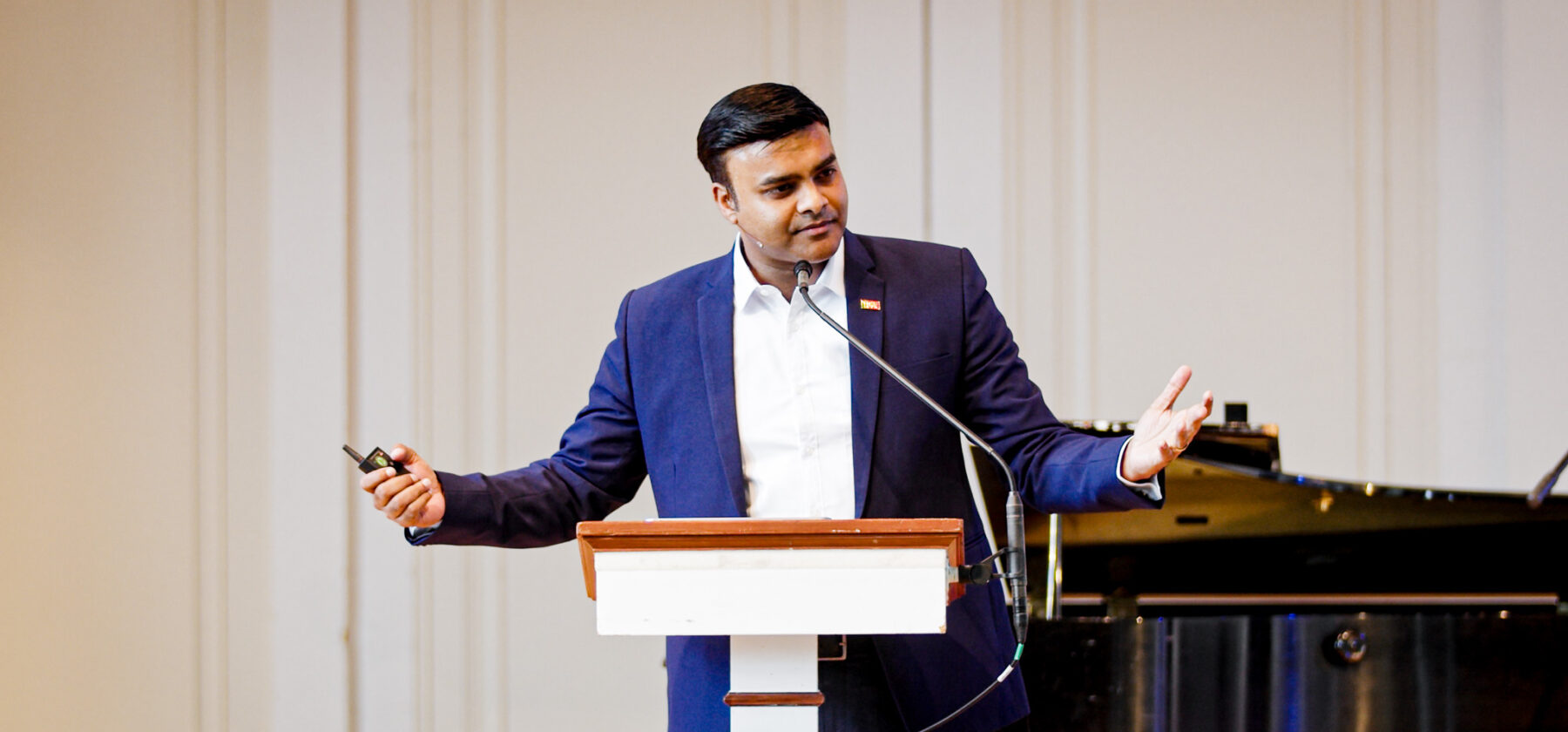Rebuilding Trust in a Divided America: Peacemaking Advice from Prashan De Visser ’08
As the 2024 presidential race enters the final stretch, the United States is more divided than ever. Pew Research Center found in 2022 that partisan hostility in America is at an all-time high: 72 percent of Republicans regard Democrats as more immoral than themselves, and 63 percent of Democrats say the same about Republicans.
Gordon alum Prashan De Visser ’08, founder of Global Unites, knows all too well where unchecked hostility can lead. When he was born in his native country of Sri Lanka, his nation was in the middle of a civil war. During a visit to Gordon on September 18, De Visser spoke about how such great divides can heal through the power of peacemaking as defined in Scripture, calling Christians to be catalysts for hope in the United States.
Blessed are the Peacemakers
With over two decades of peacemaking experience, De Visser wants to bring Global Unites to America because he believes this nation is almost at a “tipping point.” Pew Research shows that the chasm around political ideologies has increased drastically just between 2014 and 2016 with over 50% of both parties viewing members of the other party as a threat to the nation’s democracy.
“When you refer to a political party across the aisle as a threat to your nation’s democracy, that becomes dangerous, because then it takes one or two individuals who say, ‘I am going to neutralize the threat,’ and take it upon themselves to become violent or to take down somebody, and that creates a cycle of violence,” he said. “This has been our story in our countries in other parts of the world. We have to bring the temperature down.”
For De Visser peacemaking is not just a calling for Christians, but a mandate. He referenced the Sermon on the Mount in Matthew 5, where Jesus said, “Blessed are the peacemakers, for they shall be called the children of God.” De Visser interpreted this to mean that, since all Christians are children of God, we are therefore all called to be peacemakers.
“Sometimes I feel that the Church has viewed our role as peacemakers as a Christian elective. But the more you share the heart of our Prince of Peace, you realize that peacemaking is mandatory,” De Visser told the audience. “The sad reality is, not only have most of us abdicated that responsibility, but we have also gone and decided to pick sides and start joining in the conflict and in the hostility, as if that was biblical truth.”
A Nonviolent Political Strategy
A Christian mandate for peacemaking and peacekeeping is the foundation of De Visser’s youth-focused organization, Global Unites. Taking inspiration from Dr. Martin Luther King Jr. and his belief that “Those who love peace must learn to organize as effectively as those who love war,” Global Unites participants follow pillars of character, nonviolent engagement, conflict transformation, reconciliation and grassroots movements. De Visser’s organization has used these practical, effective methods to equip 450,000 youth in the last two years across almost 20 countries in Asia, Africa and the Middle East to move towards peace.
Global Unites youth have become leaders in their communities for peace, some after narrowly avoiding becoming radicalized by ISIS or the Taliban. Participants have started their own businesses making crafts or food to help raise their communities out of poverty. Others have bravely made friends with individuals in tribes that have been enemies for decades, creating opportunities to apologize and forgive each other for the crimes their peoples committed against each other. De Visser said these examples of nonviolent change have proved twice as effective as violence ever could, even in the most unlikely of places and among the most unlikely of people. And De Visser believes American youth can do the same here.
“We in the Church have been encouraged and challenged to transform the broken structures in our society. It’s not just about healing people, but repairing the broken structures and laboring together to repair those structures. Our societies are dysfunctional because there are fundamental things that are broken, and we have to have the ability to acknowledge it and engage it and ask God’s wisdom to guide us through that,” De Visser said.
The Foundations of Peacemaking
De Visser encouraged the college-age Christians in attendance to be peacemakers in America by embodying three characteristics: empathy, humility and integration. The first required trait is empathy, where we see someone else’s perspective, pain and story are as important as our own. “The same blood that Jesus shed on the cross of Calvary for your political opponent is the blood that he shed for you; he was thinking of your opponent as much as he was thinking of you. So we may need to get off our own high horses,” De Visser said.
The second trait is humility, and De Visser referenced Psalm 139, where David says: “Search me, O God, and know my heart; test me and know my anxious thoughts. See if there is any offensive way in me, and lead me in a way everlasting.” De Visser noted, “If you pray that prayer with all your heart, it’s hard for you to be self-righteous. We should walk into every conversation, every situation with the posture of humility and engage in love.”
Finally, Christians should seek intentional and authentic integration. Part of why America is so divided politically is because we spend so much of our time in close circles of people who are similar to ourselves. “How many of your friends are from the same ethnic or racial background as you?” De Visser asked. “How many of them tend to vote differently than you? How many of them come from a different denomination or socioeconomic situation than you? Let the Lord work in your heart, form you and mold you in his image, because his image includes all of us.”
 The Bell
The Bell